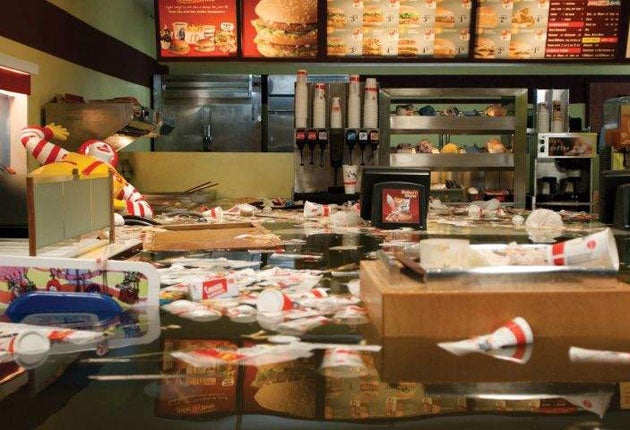Superflex: Flooded McDonald's, South London Gallery, London
Imagine if a rising tide caused by global warming claimed the very things that contributed to it

Over the years, McDonald's has become a whipping boy for environmental radicalism, its branches firebombed from Portland to Paris on the grounds of greed and waste.
Outlets spared by warlike greens have, from Moscow to Mexico, been torched by anti-imperialists for being American. So a film work called Flooded McDonald's by a Danish art collective might fill you with quiet dread, like the thought of a Peta meeting at Hackney Town Hall.
Actually, though, Flooded McDonald's turns out to be rather jolly, and also rather good. Superflex, the three-man collective behind it, make no bones about setting out to produce art with a "clear social relevance", and their past practice – one project involved the manufacture of a bio-gas plant for the poor of Central Africa – suggests a certain glint-eyed zeal. What it doesn't suggest is humour, Flooded McDonald's saving grace.
At first sight, the McDonald's of the title, projected on a large screen halfway down the South London Gallery, looks as though it might have been made by the German modelling genius, Thomas Demand. This is fair enough, since the Superflex branch is actually a model, built in an empty Danish swimming pool which was slowly filled with water. The set is the exact replica of one of those old, unreconstructed McDonald's, before they began to serve line-caught cod McNuggets and McBlanquette de Veau. Unlike Demand, not everything is modelled: the Big Macs are real rather than of cardboard, although a purist might argue that the difference is negligible. Rather than the usual clientele of drunken City boys and big-bottomed Kansans, Superflex's burger bar is empty – a Hitchcockian absence that makes it feel creepy, like the McMary Celeste.
And that, really, is it. For 20 closely-observed minutes, the collective's pretend McDonald's slowly fills with water, thus presumably conflating environmental cause and effect. (Numberless herds of eructating beef cattle = methane = holes in the ozone layer = global warming = rising sea levels.) The overall feel is of apocalypse, or rather of faux-apocalypse: never for a second in Flooded McDonald's do we lose sight of the fact that the film is a film. The slow panning shots and hand-held close-ups are straight out of a media studies textbook – they will be instantly familiar to anyone who has seen The Poseidon Adventure or Jaws or The Day After Tomorrow as the traditional vocabulary of disaster movies. You half expect Shelley Winters to appear singing Nearer, My God to Thee, or a fin to cut the surface of the increasingly scummy water.
As the waters rise, so there are moments of accidental comedy. Not entirely surprisingly, none of the Superflex trio had ever flooded a life-size McDonald's before. What happens in front of their camera happens by chance. At one point, a fibreglass sculpture of Ronald McDonald, borne aloft by the rising tide, turns a waving arm towards the audience in the manner favoured by Her Late Majesty Queen Elizabeth the Queen Mother. The flaps of pig bins waggle in chorus as the water reaches them, à la Busby Berkeley. A litotic plastic sign floats by: it reads "wet floor".
But there are other things going on in Flooded McDonald's as well. There are, for example, moments of strange beauty, when submerged potato chips and styrofoam cups fall into pleasing abstract patterns. There is the pathos of a cruciform Ronald, with a cut to a shot of an apparently bloodied french fry. And there is a dash of real horror, provided by the film's soundtrack – not the wailing strings of the Hollywood Symphony Orchestra, but the actual noise, groaning and thunderous, of a large structure filling up with water.
For all its apparent easiness, in other words, Flooded McDonald's is really rather complex. Since it is clearly a work with a message, that message must be complex, too. The words "Danish collective" and "film about McDonald's" suggest straightforward agitprop, but Superflex's work is much cleverer than that. It understands that gruesome things become popular because they fulfil a human need – for a quick hit of salt and sugar, squashiness and warmth, for nourishment that can feel like care. Flooded McDonald's is certainly judgemental, but it isn't punitive: it happily admits that life is made up of equal parts of comedy and tragedy. It is a lovely, humane film, Scandinavian in a good way. I very much recommend you see it, although perhaps leave the popcorn at home.
South London Gallery, London SE5 (020-7703 6120), to 1 March
Join our commenting forum
Join thought-provoking conversations, follow other Independent readers and see their replies
Comments
Bookmark popover
Removed from bookmarks